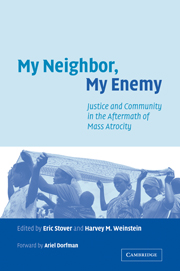Book contents
- Frontmatter
- Contents
- List of contributors
- Foreword by Ariel Dorfman
- Acknowledgments
- Introduction: conflict, justice and reclamation
- Part I Institutional approaches to justice
- Part II Social reconstruction and justice
- 7 Neighbors again? Intercommunity relations after ethnic cleansing
- 8 Memory, identity, and community in Rwanda
- 9 Attitudes toward justice and social reconstruction in Bosnia and Herzegovina and Croatia
- 10 Connecting justice to human experience: attitudes toward accountability and reconciliation in Rwanda
- 11 Public education and social reconstruction in Bosnia and Herzegovina and Croatia
- 12 Confronting the past in Rwandan schools
- Part III Survivors and justice
- Conclusion: a common objective, a universe of alternatives
- Index
12 - Confronting the past in Rwandan schools
Published online by Cambridge University Press: 05 May 2010
- Frontmatter
- Contents
- List of contributors
- Foreword by Ariel Dorfman
- Acknowledgments
- Introduction: conflict, justice and reclamation
- Part I Institutional approaches to justice
- Part II Social reconstruction and justice
- 7 Neighbors again? Intercommunity relations after ethnic cleansing
- 8 Memory, identity, and community in Rwanda
- 9 Attitudes toward justice and social reconstruction in Bosnia and Herzegovina and Croatia
- 10 Connecting justice to human experience: attitudes toward accountability and reconciliation in Rwanda
- 11 Public education and social reconstruction in Bosnia and Herzegovina and Croatia
- 12 Confronting the past in Rwandan schools
- Part III Survivors and justice
- Conclusion: a common objective, a universe of alternatives
- Index
Summary
Rwandans need to talk about their experiences, not just an imagined history, but what actually happened to them. That means they have to tell the truth.
Rwandan professional, May, 2002Shortly after the Tutsi-led Rwandan Patriotic Front (RPF) took power in July, 1994, the Rwandan Ministry of Education (MINEDUC) placed a moratorium on teaching Rwandan history in the country's schools until consensus could be reached on how history should be taught. Almost a decade later, this emergency measure remains in effect. There is much disagreement among government officials, intellectuals, and Rwandan citizens about the significance of the events leading up to and occurring during the war and genocide. So there is little agreement about what historical account to teach. In making their case, government officials pointed to the fact that hundreds of highly educated Rwandans, including doctors, lawyers, teachers, and clergy had directly or indirectly participated in the genocide. According to the government, these professionals had been educated in post-independence schools that had taught a virulent form of ethnic hatred toward Tutsi. “The propagandists,” as Alison Des Forges wrote in her book on the genocide, “built upon the lessons Rwandans had learned in school.”
The difficulty and importance of making decisions about teaching history cannot be overemphasized. Further, the ways in which memory, history, myths, and symbols are used can lead people to develop identities that either promote intergroup conflict or help to draw diverse groups together.
- Type
- Chapter
- Information
- My Neighbor, My EnemyJustice and Community in the Aftermath of Mass Atrocity, pp. 248 - 266Publisher: Cambridge University PressPrint publication year: 2004
- 7
- Cited by

